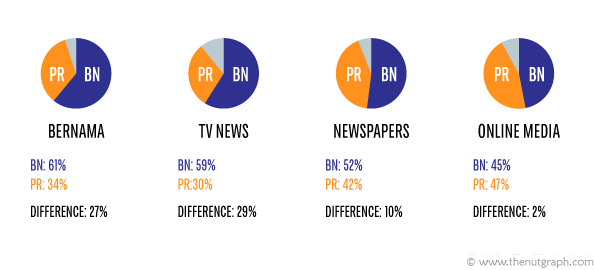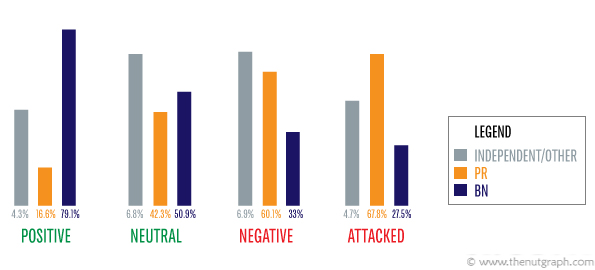YET again, the online media in Malaysia is under attack. One of the latest rebukes comes from Kelab Wartawan Muda Malaysia (KWMM) president Dzulkarnian Taib who wants the authorities to curb Malaysiakini, including shutting it down, because of its “lopsided” reporting.

Dzulkarnian is not alone in his views. Senior Barisan Nasional (BN) politicians have also lambasted the online media. Newly-minted Home Minister Datuk Seri Dr Ahmad Zahid Hamidi for example, recently accused Malaysiakini of “spin”, “twisting statements” and “creating things which are not there”. He ominously warned the news portal that he would be monitoring it very closely.
But is the online media’s reporting as biased and lopsided as the BN and its allies make it out to be?
Online most balanced
A recent media monitoring project over the general election period found that, in fact, online media was the most balanced in terms of coverage of both BN and Pakatan Rakyat (PR). The project, titled Watching the Watchdog, was conducted jointly by the Centre for Independent Journalism (CIJ) and Nottingham University’s Malaysian campus. Up to 70 coders collected data from all election news items, line by line, minute by minute, from 7 April until just after the 5 May 2013 elections. It reviewed television news and newspapers from both east and west Malaysia, online media Malaysiakini and The Malaysian Insider, and wire service Bernama.
The results of the first two weeks of monitoring for Bernama and television news demonstrated how markedly skewed both media were. Bernama gave BN a whopping 61% of its coverage compared to only 34% for PR. Television news was equally unbalanced. A total of 59% of its election coverage was on the BN, while PR only received 30%, with the remaining close to 11% devoted to independents and other election news.
The 17 newspapers that were monitored fared slightly better. Of its total coverage, 52% was on BN and 42% on PR.
As for the online media, it did have more opposition coverage than the traditional media. However, the difference between its total coverage of PR compared to its total coverage of BN was much smaller than the difference in print and broadcast. PR received 47% of the online media’s coverage compared to BN’s 45%, a mere 2% difference.

Tone
Additionally, when the data is analysed for positive or negative tone, BN received overwhelmingly positive news in Bernama, on television and in the newspapers. PR mostly received negative news in these media.
Conversely, even though the BN received negative coverage in the online media, it received more positive coverage proportionally. And while the online media did report on PR more positively than their counterparts on television or in print, it actually carried more negative coverage on the opposition coalition than it did positive news.
These statistics are a serious challenge to the oft-repeated claims that the online media give undue coverage to the opposition and are unfair towards the BN.

“What is PKR?”
In fact, what is evident is that it is the traditional media, and not the online media, that is in serious need of reform. That reform should begin with Bernama and RTM. Both are funded by public monies. Hence, they should be serving the public interest better by providing fairer coverage that reflects the media’s role in keeping citizens informed in a democracy.
 A delegate at Parti Keadilan Rakyat (PKR)’s recent national congress said that in some Felda settlements, citizens didn’t even know about the party. “They will ask you, what is PKR”, she was quoted in The Edge.
A delegate at Parti Keadilan Rakyat (PKR)’s recent national congress said that in some Felda settlements, citizens didn’t even know about the party. “They will ask you, what is PKR”, she was quoted in The Edge.
If this is true, it highlights the failings of the traditional print and broadcast media which are the primary information source for many rural citizens. If citizens don’t even know the name of a main opposition party, the media is clearly not providing enough information. And at this rate, we can for certain forget that the traditional media are providing citizens with sufficient knowledge and views to make an informed choice during elections.
And as CIJ and Nottingham University’s research findings demonstrate, such critical gaps in a citizen’s knowledge would only happen if voters relied solely on the traditional media as is the case where internet penetration is low. It would clearly not happen if a citizen depended solely on the online media for news and information.
Disingenuous
It is therefore disingenuous of BN politicians and their pressure groups to claim that there is media freedom because the opposition gets more airtime in the online media. It is also duplicitous to declare that it’s OK for the traditional media to be pro-BN since the online media is pro-opposition.
Firstly, the opposition doesn’t get so much more airtime and better coverage in the online media. Indeed, the Watching the Watchdog project demonstrates that BN gets nearly as much coverage, and positive coverage at that, in the online media, too.
Secondly, the internet is a much freer space. Anyone can set up a website or blog without requiring a licence unlike print and broadcast media which require government permits. So even if there were more positive news about PR online, the BN is free to fill cyberspace with cheery news about itself and criticise PR all it wants. This, it generally does, through BN-friendly blogs and the openly-acknowledged BN cybertroopers.
If opposition-related news is more popular online with citizens, this is more likely to do with the lack of credible opposition coverage in the BN-controlled traditional media. The BN thus has only itself to blame if internet users gravitate towards opposition news online.

Catch-22
What should also be noted is that the 2013 election results forefront a Catch-22 situation for PR and the electorate. Even though it is the traditional media which is clearly “lopsided” and in many instances unethical, PR and its supporters cannot ignore the traditional media. For example, PR cannot call for a traditional media boycott and pooh-pooh what they say and then wonder later why rural results differed so greatly from urban centres where the internet penetration and usage is high.
Sure, the online media provides many of us in urban settings with all the information we need without us having to ever pick up a newspaper or watch the news on TV. But many others are being deprived of critical information because they only have access to newspapers and TV.
It is clear that serious reforms are needed to make the public-funded media more independent and to free the newspapers from government control. In the meantime, we need to continue supporting the independent online media, as it appears that they are the only ones capable of giving us balanced news for now. ![]()
Ding Jo-Ann was part of CIJ’s media monitoring team for GE13. She was previously CIJ’s media monitor and has monitored media coverage of both Bersih 2.0 and Bersih 3.0. She is also the co-author of CIJ’s Freedom of Expression 2011 report.


TNG says
This study seems to concentrate on Malaysiakini, The Malaysian Insider and Bernama. I believe the result will be very different if they include news like Malaysia Chronicle. So I reckon this is not a well designed research study.
ellese says
What a load of bull. Of course MSM is one sided. But why can’t online media be better and adopt US SPJ ethical standards. The online media distorts stor[ies] and facts on a daily basis. For example at The Nut Graph, I can’t even mention an online media which always distort stor[ies] unethically without being censored. This online media criticises Utusan but adopts Utusan’s style of reporting. Always closes off any reporting with their views to discolour events. They distort with headers and [don’t] even given a right of response. Utter rubbish if they want to claim a higher moral ground.
This is the problem in our country. We cannot close the divide because all our media is too partisan. The fact [that] I cannot name the media at nutgraph shows the severity of censorship.
The way forward is we must run away from MSM and online media’s rubbish standards. Educate the rakyat [on] how to evaluate news. Educate rakyat on standards and ethics on journalism. Those who preach for balance[d] media must show how its practised. Not just talk only and censor contrarian views. Then we can say we’re moving ahead. Right now all we have is rubbish MSM and online media.
P.s. This write-[up] is really shallow. When is it fair? When you report more of PR? Is it fair when pr is reported positively more than 50%? Why can’t they just be balance[d] and fair. This is the typical shallow argument of this article. Why must nut graph do a write [up] favouring online media when it’s far from fair balance[d] and objective. This is the problem of the editors at the online media I cannot name here at nutgraph.
Wave33 says
Ellese quote: “Those who preach for balance[d] media must show how its practised. Not just talk only and censor contrarian views.”
Ellese [isn’t it hypocritical to] comments in your own blog and [not] tolerate contarian views. I ask you to practice what you preach. […]
Kononnya, cakap saja lebih.
Wave33 says
Ellese,
It is hypocritical that you do not allow contarian views on your blog. How are you going to achieve a fair, balanced and objective view?
You censor views which are not in line with you.
Kononnya, right to reply.
Education starts at home before you educate the world.
Adam says
One cannot depend on the MSM for fair and balanced news as most of them are owned and controlled by BN. We must refer to online media for a balanced view. Even then, we have to check with other sources to confirm what has been reported.
I personally do not think that the online media is lopsided in their reporting. Of course, it would appear to be so when compared to that of the MSM; the main reason being that the MSM is horribly skewed to one side.
If you ask me, the online media should report more positively on the opposition for a more balanced overall view. Just kidding. Any media should report conscientiously and fairly as otherwise they will lose credibility and their readership will suffer like what is happening to the MSM now.
TNG says
Adam, If this is not lopsided, then I don’t know what is.
http://www.malaysia-chronicle.com/
Then there is The Malaysian Insider which said no Western countries want rare earth refineries, not in their most remote areas. It said so to support Pakatan’s anti-Lynas position. Guess what? A quick Google will shows the exact opposite.
ellese says
Wave,
This is pure personal attack. […]. Save for one or two fraudulent and dishonest commentators I have published all even with crude language. Even for those few commentators, I’ve published all their [comments] albeit in their own special post. For example, for those who have used various fraudulent names with similar IP [addresses] and wrote purely with crude spite and no rational point, I’ve regrouped them under a post especially for idiots. Never have I once censored their comments. But they have stopped replying simply because they don’t want to be associated as such. But I did not censor. You know that.
So don’t lie. Be aware that I however always reserve the right to respond in kind.
khairil says
It doesn’t matter whether media is online or offline.
The NST, Berita Harian, The Star and the Malay Mail have online editions, and all have been so castrated that even a child in Form Four can tell that they are obliterating the truth in order to safeguard the govt.
I’m not surprised our beloved HM doesn’t like Malaysiakini. If I was as competent as he is, I wouldn’t either.
Melayu Bukan Islam says
Utusan Malaysia is infamous for spinning news of non-Muslims [being] the enemies of Islam, non-Muslims insulting Islam, [and how] Muslims do not insult other religions, blah blah blah.
When Malays kill Malays as in the case of Umno vs Ibrahim Mahmud in the Memali incident in 1985, Utusan Malaysia did not dare spin the news of Malays [police, Umno …. , Musa Hitam] as the enemies of Islam.